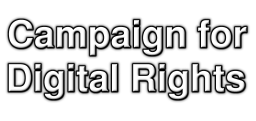
| Friday January 09, 2026 |
| Home |
| FAQ |
| Mailing Lists |
| Issues |
| - BBC Creative Archive |
| - EUCD |
| - Copy Protected CDs |
| - Dmitri Sklyarov |
| Contact Us |
| Resources |
| Links |
Positive Fair Use
"Governments should legislate that fair use entitlements cannot be overriden."
What is fair use?
"Fair use" is the doctrine in US copyright law entitling the public to access and use copyrighted works even when this would normally be infringement. It is effectively a limitation on copyright.Copyright law requires that those wishing to reproduce or distribute a work may only do so with the permission of the copyright holder (normally the author or his publisher). Fair use permits certain exceptions to this rule:
- certain types of educational use (generally by librarians and teachers)
- criticism and review
- private non-commercial copying (not in the UK)
- parody (not in the UK)
Why does fair use need to be positively defined?
Just as copyright is only really the entitlement to bring a court action, fair use only formally exists as an automatic defence to such an action. That is, fair use has a negative definition: it only exists in the law as something you're not allowed to be sued for doing. This is no longer enough.You can't initiate a court action to get back an entitlement you should have under the fair use doctrine. This is a problem because it's possible to obstruct fair use by the use of law or technology. Here's how:
| Circumventing Fair Use | |
| Technology | Contract Law |
|
The rightholder can lock up his content with encryption or other
access controls, and by mediating access to the work may control
whether or not it can be reproduced, regardless of any limitations
in copyright law.
There is no incentive for the rightholder to play fair and make the technological protection system honour the limits of copyright, indeed this is the attraction of technological protection: it doesn't expire seventy years after the death of the author, and money can be made from selling fair use entitlements back to the public. |
The rightholder can get the user to agree to a contract restricting
his use. This could potentially go further than technological measures,
as the user could be made to agree, for instance, not to write a critical
review of the rightholder's work.
A drawback to this approach is that contracts will only bind single individuals, and many such contractual terms are currently unenforceable. Big software firms in the US are seeking to change this through the passage of the UCITA. Constituting as it does an abuse of the unequal bargaining positions of the rightholder and the user, such a contract might also be unenforceable on equitable grounds. |
At any rate, there is a profit to be made from these sorts of extensions to intellectual property protection, and the public
What should be done?
Governments should legislate that fair use entitlements cannot be overriden. The current formulation of the law, where fair use entitlements are only protected by providing them as a defence to a lawsuit, is now inadequate.Fair use and public libraries do not, as some have said, constitute a tax on rightholders. They should be supported as a reasonable democratic compromise, balancing the otherwise exclusive control which copyright grants rightholders over information works they have created, often by borrowing ideas from the public domain.
| webmaster@ukcdr.org |